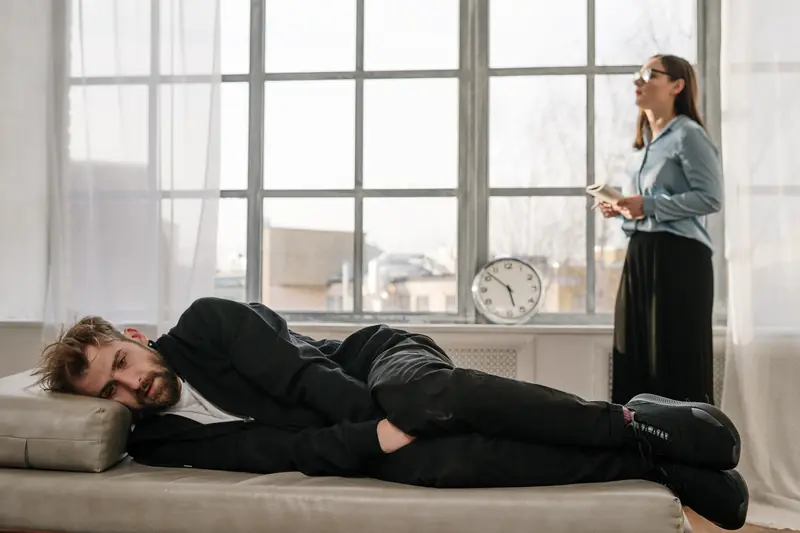
The state of impotence can affect men not only in their “golden years,” so the fear shouldn’t be of aging itself, but rather the mistakes made in youth. Is it correct to consider erectile dysfunction a “permanent disease,” and when can erectile issues be reversible?
Introducing: Impotence
Erectile problems are grounds for a diagnosis of “erectile dysfunction” if more than a quarter of attempts at intercourse are unsuccessful. Doctors refer to impotence as the most severe form of erectile dysfunction – a persistent inability to engage in sexual intercourse. Surprisingly, this isn’t just a private drama for those involved; it has societal implications as well! Research shows that men with this disorder tend to be less productive at work, often taking more sick days. This makes sense: “impotentia” translates from Latin to “powerlessness” or “weakness.” For the “stronger sex,” this term is almost an insult; outside the doctor’s office, the word “impotent” is often used in a mocking or derogatory context.
Healthy male arousal is triggered by the synthesis of nitric oxide in endothelial cells (the tissue layer inside the arterial wall). This substance causes the blood vessels in the pelvic area to dilate, allowing blood to fill the erectile tissues. Meanwhile, in small local venules, the opposite occurs: their contraction prevents blood from flowing out, maintaining the erection.
Erectile dysfunction can manifest in various ways, depending on the underlying pathology. Previously, the main culprits of impotence were thought to be psychological issues or testosterone deficiency. Vascular disorders can prevent sustained penile erection, leading to uncontrolled ejaculation (premature release of semen) while spontaneous erections remain intact. A lack of adequate responses to stimulation in the presence of spontaneous erections indicates a psychological nature of the disorder.
However, recent studies identify organic “errors” in the erection process as the most common cause. Unlike factors that can trigger sexual impotence, impotence develops due to pathological changes in the organ’s functioning mechanism. Organic damage prevents both adequate and spontaneous erections, creating the most complex clinical situation.

External Signs of Impotence in Men
You can recognize an “impotent” man even by indirect signs: inappropriate reactions and “avoidant” behavior.
Concerning symptoms include:
- weakening or disappearance of erection during attempts at sexual contact (the problem gradually worsens, with an increasing frequency of failures);
- absence of nocturnal and morning spontaneous erections;
- shortened duration of sexual intercourse and rapid ejaculation;
- decreased potency with a reduction in sexual activity by half or more;
- irritation from attempts at physical contact;
- previously uncharacteristic shyness and unwarranted aggression;
- avoidance of “delicate” topics in conversation and disallowing sexual innuendos.
However, it’s important to distinguish similar signs that do not indicate impotence. Temporary manifestations of sexual dysfunction may hide physiological changes in the body’s functioning, particularly during andropause. Male climacteric is a hormonal adjustment that occurs in middle age (ages 45-60). During this period, testosterone levels gradually decrease, leading to a slow decline in sexual function. Typically, this process blends smoothly with general signs of aging, but a pathological course can provoke uneven declines in testicular function.
Symptoms of hormonal adjustment include:
- decreased libido;
- delayed or premature ejaculation;
- weakened erection and quick fatigue during sexual intercourse;
- irritability and nervousness;
- decreased work capacity and rapid fatigue;
- poor sleep (difficulty falling asleep and frequent nighttime awakenings).
Due to age-related changes, a man may lose interest in work and feel a sense of resignation (sometimes leading to severe depression). Many begin to seek ways to “regain their youth” on their own. After 3-5 years, this critical period passes. Support from loved ones, physical activity, a healthy lifestyle, and psychological comfort can help navigate it.
Causes of Impotence
Since various processes in the body are responsible for erection, disruptions can occur at any stage.
Erectile dysfunction can arise from emotional and physical exhaustion, systemic use of anabolic steroids (performance-enhancing supplements), and certain medications (neuroleptics). Causes of sexual disorders may include diseases of the endocrine and nervous systems, infectious and inflammatory diseases of the urogenital system, circulatory disorders, hypertension, surgical operations, injuries, stress, family conflicts, and more.
Hypodynamia significantly undermines erection: it disrupts local blood flow and the balance of blood supply to the sexual organ.
Alcohol abuse also hinders erection: it negatively affects the glands of the endocrine system, particularly the sexual ones. Experts identify beer as the most harmful alcohol for men: it contains an enzyme similar to the female hormone – estrogen. Regular beer consumption can provoke hormonal imbalances by reducing the production of the male hormone testosterone. As the saying goes, “the belly grows while the tip shrinks.”
Prolonged sexual abstinence can also lead to erectile dysfunction. A decrease in potency and an increased likelihood of premature ejaculation are noted after two months to six months of intimacy absence.
Consequences of Impotence
This condition can lead to diseases due to insufficient blood circulation in the pelvic organs. The danger of a lack of sexual life poses a risk of chronic stagnant prostatitis. The inability to engage in sexual intercourse exacerbates the pathology and threatens new health risks, particularly in the sexual sphere.
At the same time, doctors find a positive aspect in the deliberate abstention from sex and marital relationships (celibacy). In active sexual life, specialists see a factor that exhausts the male body, while abstaining and losing the ability to “enjoy” allows the male body to retain “good” cholesterol, lecithin, iron, and other beneficial substances that help strengthen the nervous system, prevent vitamin deficiency, and prolong youth.
Those who voluntarily and consciously choose to cease sexual activity can expect benefits from this decision. In such cases, abstaining from sexual contact can activate mental and spiritual development.
As is well known, voyeur Salvador Dalí even boasted of being impotent: he claimed it was a necessary condition for the birth of a great artist.
The war and alcohol played a cruel role in the complicated fate of Erich Maria Remarque: he would start conversations with women by saying what the writer’s close friend Marlene Dietrich revealed to the world: “Madam, I must warn you that I am impotent.”
And wordsmith Ernest Hemingway once wrote: “When I became impotent, it felt like I had fallen off a wild stallion.” Although this confession was voiced by a character, the author knew from personal experience what he was talking about: the shock after his first divorce led to temporary impotence. It is known that while writing his novels, the author not only neglected sex but also everyday communication with his wives, concentrating his energy on creativity.

What to Do About It?
Comprehensive assistance is prescribed based on diagnostic data and considers the etiology of the disorder. Modern medicine can offer erection rings and many other treatments for this common issue. Treatment methods are divided into two groups: conservative and surgical.
The emergence of medications for treating erectile dysfunction, known as the Viagra phenomenon, has played a crucial role in overcoming male impotence. In 95% of cases, stimulating pills that enhance potency with a nitric oxide effect, such as sildenafil (Viagra), avanafil (Stendra), vardenafil (Levitra), tadalafil (Adcirca), and others, prove effective. It turns out these medications have not only therapeutic but also psychological effects: after several uses, men experience increased self-esteem and sexuality, allowing them to engage in sex without medication.
For addressing vascular-related causes, vasoactive drugs that affect the tone and diameter of blood vessels are considered effective.
In cases of psychological issues, psychotherapy based on suggestion and physical relaxation is conducted. The quality of results improves when the man undergoes treatment not alone but with a partner.
Doctors’ recommendations include weight control and rational nutrition. The diet should primarily consist of phosphorus-rich foods (cod, beef) and selenium (garlic, olives, celery, seafood). It’s important to consume lean meats and fatty fish: sardines, salmon, herring, mackerel, and anchovies. Nuts, pomegranates, and tomatoes are recommended for stimulating potency and nerve activity. “Male” elements include L-carnitine, omega fatty acids, folic acid, iron, zinc, magnesium, potassium, phosphorus, selenium, and vitamins A, B3, B6, D, E, and C. It’s advisable to avoid excessive consumption of carbonated, energy, and alcoholic beverages.
Treating Impotence at Home
To stay in shape, men should drink tea made from nettle leaves and seeds half an hour before meals. If impotence is not linked to chronic diseases or organic damage, folk remedies based on deer antlers, eleutherococcus, and ginseng may prove effective. Active biological substances and vitamins enhance blood supply to the male organ, overcome deficiencies of trace elements, and normalize the psycho-emotional background. The downside of such treatment is its temporary and unstable effect.
Since self-medication poses risks of exacerbating underlying conditions and developing new pathologies (which can lead to hypervitaminosis, allergic reactions, cardiovascular problems, etc.), herbal tinctures and decoctions should only be used with the approval and under the supervision of a doctor. Treating impotence in men is a complex but necessary step toward health.
Impotence: Prevention
It’s easier to prevent any disease than to treat it. To keep things “up” in your pants, follow these simple rules.
Quit Harmful Habits
Don’t suppress your immune system with excessive alcohol and tobacco. In the face of immune system disruptions, any infection will feel “at home” in your body, leading to impotence and reproductive issues.
Treat Infections
Don’t neglect sexually transmitted diseases. Fight not only bacteria but also viruses.
Avoid Overcooling
The prostate and testicles suffer most from the cold. Both are related to reproductive function.
Stay Physically Active
Active games, running, and moderate exercise are the best remedies for hypodynamia and stress. However, excessive strain can lead to chronic fatigue and, conversely, may cause a decrease in libido. For better physical shape, gym-goers often resort to hormonal medications that provide only superficial effects, risking sexual disorders and even infertility.
Eat Healthy
Men need to maintain a balance of proteins and carbohydrates and consume enough fiber. Don’t forget about vegetables. Foods that support male strength include celery, ginger, parsley, oysters, mussels, and moderate amounts of dry red wine and dark chocolate (with 70% cocoa).
Maintain a Healthy Sex Life
Safe and regular sex is essential. The frequency of sexual activity is a personal matter. The key is that sexual encounters should be pleasurable. According to specialists, a constant partner, with whom one feels a connection, helps men achieve harmony in bed and in relationships.
